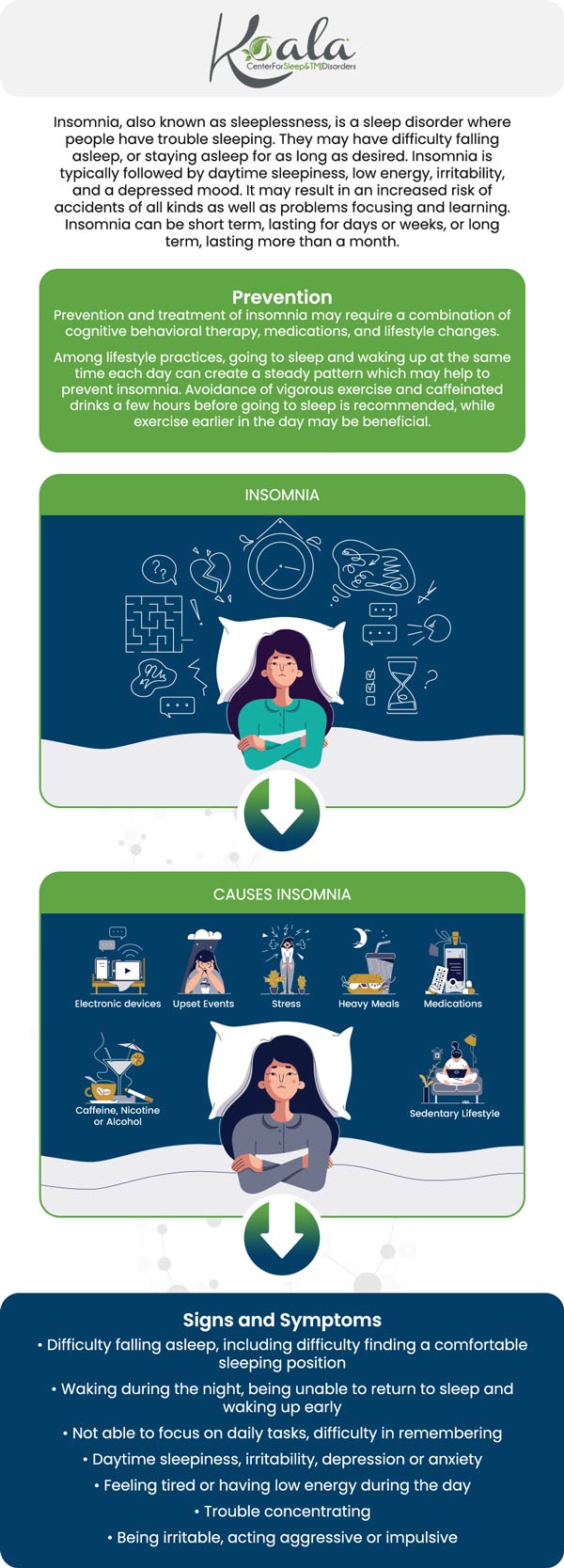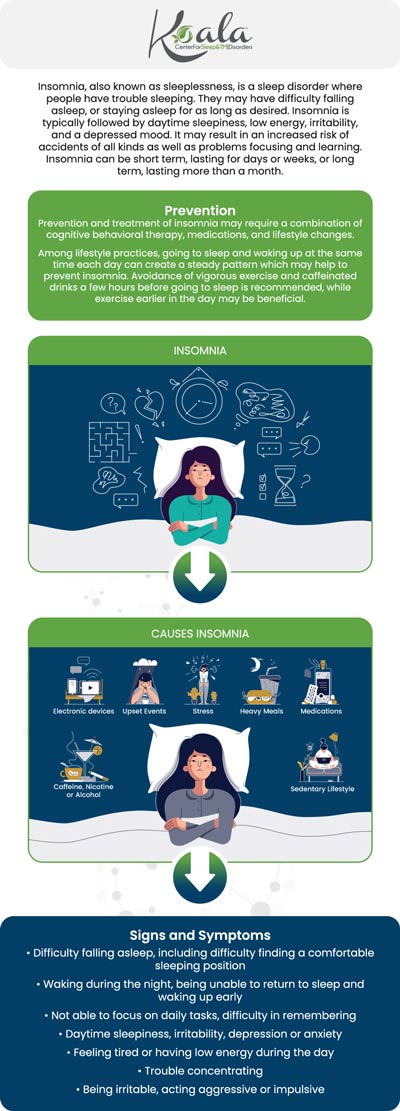Everything You Need to Know About Insomnia
If insomnia gets severe, it can affect your life. So don’t let it become a hurdle. Call our dedicated sleep team today at Koala Center For Sleep & TMJ Disorders or visit us online to book an appointment. We have convenient locations across the U.S. in Bloomington IL, Peoria/Dunlap IL, El Paso TX, and Wausau WI.




Table of Content:
What are the signs and symptoms of insomnia?
What are the types of insomnia?
What are the risk factors for insomnia?
What treatments are suggested for insomnia?
Insomnia is a sleep disorder in which a person has a hard time falling or staying asleep; it affects millions of people across the world and typically occurs when a person has a lot on their mind and is unable to relax. People with insomnia often do not get an adequate amount of quality sleep every night, which can make it difficult to function during the day. Insomnia can cause many symptoms, including mental symptoms, such as trouble concentrating, anxiety, and depression, as well as physical symptoms, such as restlessness, fatigue, and headaches. There are many different types of insomnia, and the most common types are primary insomnia and secondary insomnia.
Insomnia symptoms may include:
– Difficulty falling asleep at night
– Waking up during the night
– Waking up too early
– Not feeling well-rested after sleep
– Daytime tiredness or sleepiness
– Irritability, depression or anxiety
– Difficulty paying attention, focusing or remembering
– Increased errors or accidents
– Ongoing worries about sleep
There are two main types of insomnia:
– Short-Term Insomnia — Also known as acute insomnia or adjustment insomnia, short-term insomnia is a brief episode of difficulty sleeping; it is often caused by a stressful life event, such as the loss of a loved one, a new medical diagnosis, recovering from substance use, or a major relationship change. As with most acute conditions, acute insomnia lasts for less than three months; symptoms may fade on their own as time passes and as a person learns to cope with the incident that caused their sleeping problems. However, if persistent, short-term insomnia can become chronic insomnia.
– Chronic Insomnia — Chronic insomnia is a long-term pattern of difficulty sleeping and is characterized by an inability to fall asleep or stay asleep at least three nights per week for longer than three months. The inability to get adequate sleep may be persistent or go away and recur with long episodes that can last for months at a time. Chronic insomnia has many potential causes, like acute insomnia, it can be tied to stressful situations, but it may also be related to poor sleep hygiene, irregular sleep schedules, mental health disorders, persistent nightmares, medications, underlying physical or neurological problems, a bed partner, and other sleep disorders.
While insomnia is primarily classified as either acute or chronic, there are other terms that may be used to describe insomnia that can help to better understand and categorize the sleep disorder. These include:
– Sleep Onset Insomnia
– Sleep Maintenance Insomnia
– Early Morning Awakening Insomnia
– Mixed Insomnia
– Comorbid Insomnia
Certain risk factors increase the likelihood of developing insomnia; the most commonly associated risk factors with insomnia include:
– Advanced Age
– Chronic diseases, such as:
– Diabetes
– Kidney disease
– Lung disease
– Arthritis
– Alzheimer disease
– Parkinson disease
– Heart disease
– Gastrointestinal reflux disease (GERD)
– Sleep apnea
– Restless legs syndrome
– Fibromyalgia
– Alcohol or drug use disorders
– Medications, such as:
– Stimulants, such as methylphenidate, amphetamines, dextroamphetamine
– Decongestants and cough and cold remedies
– Diet pills
– Steroids
– Certain high blood pressure medications
– Theophylline—used to treat asthma
– Phenytoin—used to treat seizure disorder
– Levodopa—used to treat Parkinson disease
– Selective serotonin reuptake inhibitors (SSRIs)
– Gender
– Psychological factors, such as:
– Stress
– Anxiety disorders
– Bipolar disorder
– Depression
– Lifestyle Behaviors, such as:
– Smoking or using other tobacco products
– Drinking alcohol or beverages containing caffeine
– Exercising close to bedtime
– Following an irregular morning and nighttime schedule
– Doing mentally intense activities before bed
– Night Shift Work
– Long-range Jet Travel
– Poor Sleep Environment
The treatments for insomnia are dependent on the underlying cause of the sleep disorder. Sleep doctors typically perform a diagnosis of insomnia to determine its cause; these may include:
– Physical exam
– Sleep habits review
– Sleep study
At Koala® Center For Sleep & TMJ Disorders, we can help you find the best treatment for your insomnia so you can start getting quality sleep. We serve patients from all across the United States.

Additional Services You May Need
▸ KoalaKIDZzz®
▸ Sleep Apnea
▸ Snoring
▸ TMJ Disorder
▸ Fatigue
▸ Sleep Disorders
▸ Weight Loss
▸ CPAP Alternative
▸ Oral Appliances




